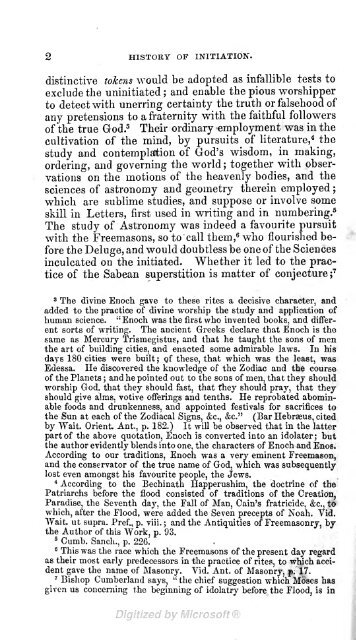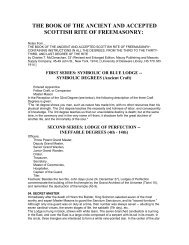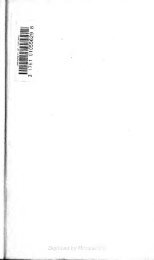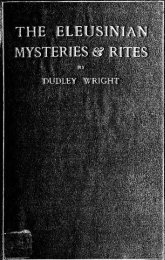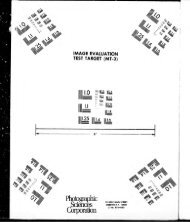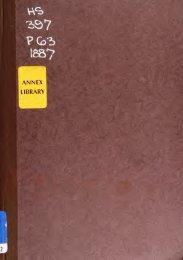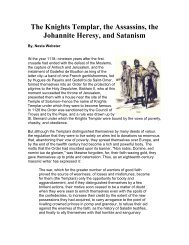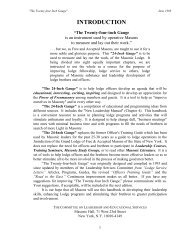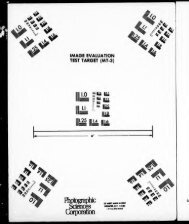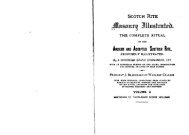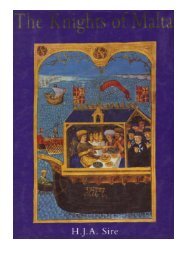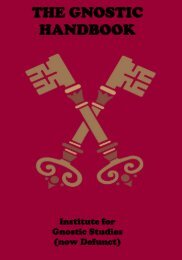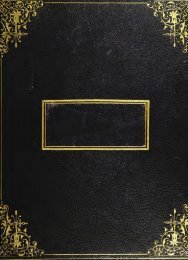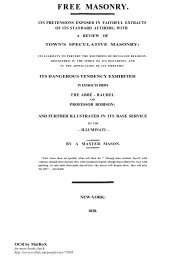The History of Initiation - The Masonic Trowel
The History of Initiation - The Masonic Trowel
The History of Initiation - The Masonic Trowel
Create successful ePaper yourself
Turn your PDF publications into a flip-book with our unique Google optimized e-Paper software.
2 HISTORY OF INITIATION.<br />
distinctive tokens would be adopted as infallible tests to<br />
exclude the uninitiated ; and enable the pious worshipper<br />
to detect with unerring certainty the truth or falsehood <strong>of</strong><br />
any pretensions to a fraternity with the faithful followers<br />
<strong>of</strong> the true God. 3 <strong>The</strong>ir ordinary employment was in the<br />
cultivation <strong>of</strong> the mind, by pursuits <strong>of</strong> literature, 4 the<br />
study and contemplation <strong>of</strong> God's wisdom, in making,<br />
with obser-<br />
ordering, and governing the world ; together<br />
vations on the motions <strong>of</strong> the heavenly bodies, and the<br />
sciences <strong>of</strong> astronomy and geometry therein employed ;<br />
which are sublime studies, and suppose or involve some<br />
skill in Letters, first used in writing and in numbering. 5<br />
<strong>The</strong> study <strong>of</strong> Astronomy was indeed a favourite pursuit<br />
with the Freemasons, so to call them, 6 who flourished before<br />
the Deluge, and would doubtless be one <strong>of</strong> the Sciences<br />
inculcated on the initiated. Whether it led to the prac-<br />
7<br />
tice <strong>of</strong> the Sabean is<br />
superstition matter <strong>of</strong> conjecture;<br />
3 <strong>The</strong> divine Enoch gave to these rites a decisive character, and<br />
added to the practice <strong>of</strong> divine worship the study and application <strong>of</strong><br />
human science. ''Enoch was the first who invented books, and different<br />
sorts <strong>of</strong> writing. <strong>The</strong> ancient Greeks declare that Enoch is the<br />
same as Mercury Trismegistus, and that he taught the sons <strong>of</strong> men<br />
the art <strong>of</strong> building cities, and enacted some admirable laws. In his<br />
days 180 cities were built; gf these, that which was the least, was<br />
Edessa. He discovered the knowledge <strong>of</strong> the Zodiac and the course<br />
<strong>of</strong> the Planets ; and he pointed out to the sons <strong>of</strong> men, that they should<br />
worship God. that they should fast, that they should pray, that they<br />
should give alms, votive <strong>of</strong>ferings and tenths. He reprobated abominable<br />
foods and drunkenness, and appointed festivals for sacrifices to<br />
the Sun at each <strong>of</strong> the Zodiacal Signs, &c., &c." (Bar Hebraeus, cited<br />
by Wait. Orient. Ant., p. 182.) It will be observed that in the latter<br />
part <strong>of</strong> the above quotation, Enoch is converted into an idolater; but<br />
the author evidently blends into one, the characters <strong>of</strong> Enoch and Enos.<br />
According to our traditions, Enoch was a very eminent Freemason,<br />
and the conservator <strong>of</strong> the true name <strong>of</strong> God, which was subsequently<br />
lost even amongst his favourite people, the Jews.<br />
4<br />
According to the Bechinath Ilapperushim, the doctrine <strong>of</strong> the<br />
Patriarchs before the flood consisted <strong>of</strong> traditions <strong>of</strong> the Creation,<br />
Paradise, the Seventh day, the Fall <strong>of</strong> Man, Cain's fratricide, &c., to<br />
which, after the Flood, were added the Seven precepts <strong>of</strong> Noah. Vid.<br />
Wait, ut supra. Pref., p. viii. and the ;<br />
Antiquities <strong>of</strong> Freemasonry, by<br />
the Author <strong>of</strong> this Work, p. 93.<br />
5 Cumb. Sanch., p. 226.<br />
6 This was the race which the Freemasons <strong>of</strong> the present day regard<br />
as their most early predecessors in the practice <strong>of</strong> rites, to which accident<br />
gave the name <strong>of</strong> Masonry. Vid. Ant. <strong>of</strong> Masonry, p. 17.<br />
7<br />
Bishop Cumberland says, "the chief suggestion which MBses has<br />
is in<br />
given us concerning the beginning <strong>of</strong> idolatry before the Flood,


